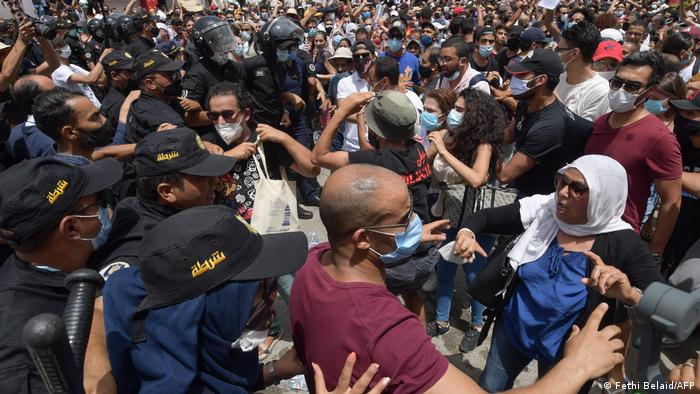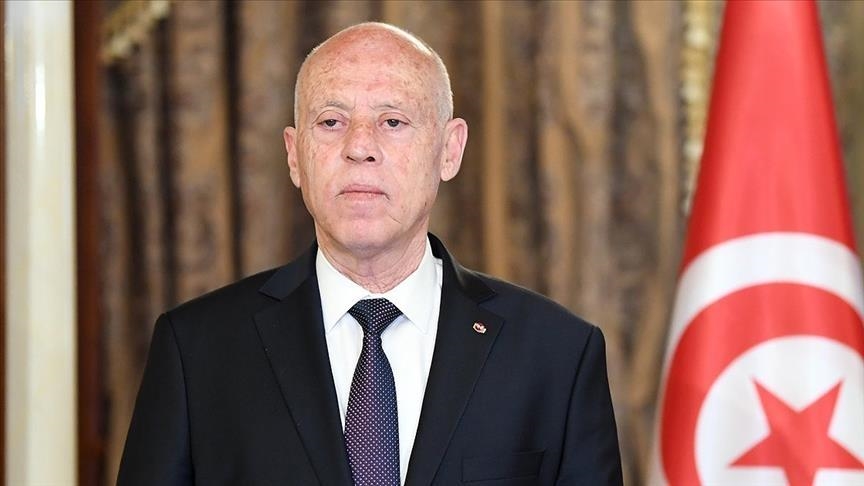 AFP
AFP A photo from Agence France-Presse(AFP) showing clashes between protesters and security forces in Tunisia
PAVIA, ITALY (AFRICA NEWS MATTERS)
Democracy has taken a hit in the African nation of Tunisia, once again. This comes 10 years since the Jasmine Revolution.
Tunisia’s President Kais Saied continues to adopt measures that contradict his constitutional duties. Following elections in 2019, the number of internal divisions within the parliament began to grow. Recently Saied acted unilaterally and without respect for the constitution which he pledged to respect when he took office in 2019. In July 2021 he sacked the prime minister and suspended the parliament. Following disagreements expressed by 120 deputies gathered to respond to the restrictive measures, the president decided to impose the dissolution of the assembly altogether.
One has to wonder what his true goal is. Saïed appears to be exploring all options to prevent the transition from a purely presidential to a semi-presidential system. The president appears willing to go beyond the difficulties that arose during the previous election crisis. Indeed, Tunisia is now being described as an “unfortunate example” because of recent measures that have weakened control and accountability within its systems of governance.
Measures to Build Trust Not Working
To re-establish his support among his constituents, Saïed made two major promises, both of which are expected to be fulfilled by the end of the year. Firstly, he promised “new elections” on December 17, the 12th anniversary of the Jasmine Revolution. Secondly, he promised a new electoral law and amendments to the 2014 Constitution. In addition, a popular consultation was launched in January, giving citizens the opportunity to suggest how the new electoral law should look and what changes to the constitution should be made.
However, less than 6% of Tunisians participated in the initiative a few days before it closed, indicating a growing skepticism between citizens and the president.
Political Consequences
Saïed, a constitutional law professor and so-called outsider to Tunisian politics, has carried out what has been described as a ‘constitutional’ coup d’état, invoking Article 80 of the Constitution on the grounds of a feared ‘imminent danger to the country. His actions have resulted in instability in the region’s most nascent democracy. Alliances are now short-lived and have little impact. Relations and ties with other parties have been severed.
According to the Political Observatory, a political studies research association, by dissolving parliament, “President Saïed has dealt a severe blow to Tunisia’s democratic project. Maintaining the existence of the Parliament clearly does not pose a threat to the country’s independence or continuity “.
From the perspective of the Euromed Monitor, the president’s action is in violation of the Constitution: “President Saied cannot base his decision on Article 72 of the Constitution, as this paragraph stipulates that the president of the Republic is the head of the state, a symbol of its unity, guarantees its independence and continuity, and ensures respect for the Constitution.”
A Fight Beyond Politics
Despite the legitimate concerns raised by many, Tunisia has never had a Constitutional Court, so it is difficult to legally untangle what the president has done and continues to do.
The country has not seen much progress in the 9 months since the turn to authoritarianism. The promised radical turnaround has not occurred. Most indicators remain negative, and in some cases are worse than they were before July 2020. Corruption, one of Tunisia’s most serious problems, remains widespread throughout the country. According to Transparency International’s annual report on the Global Corruption Perceptions Index, Saied’s actions have backfired on his promises.
COVID-19 also played a role in increasing Tunisians’ resentment of their own ruling class. Despite the strict measures put in place to combat COVID-19, such as the nationwide curfew, Tunisia has the highest number of deaths and Covid infection rates in the Arab world and Africa.

